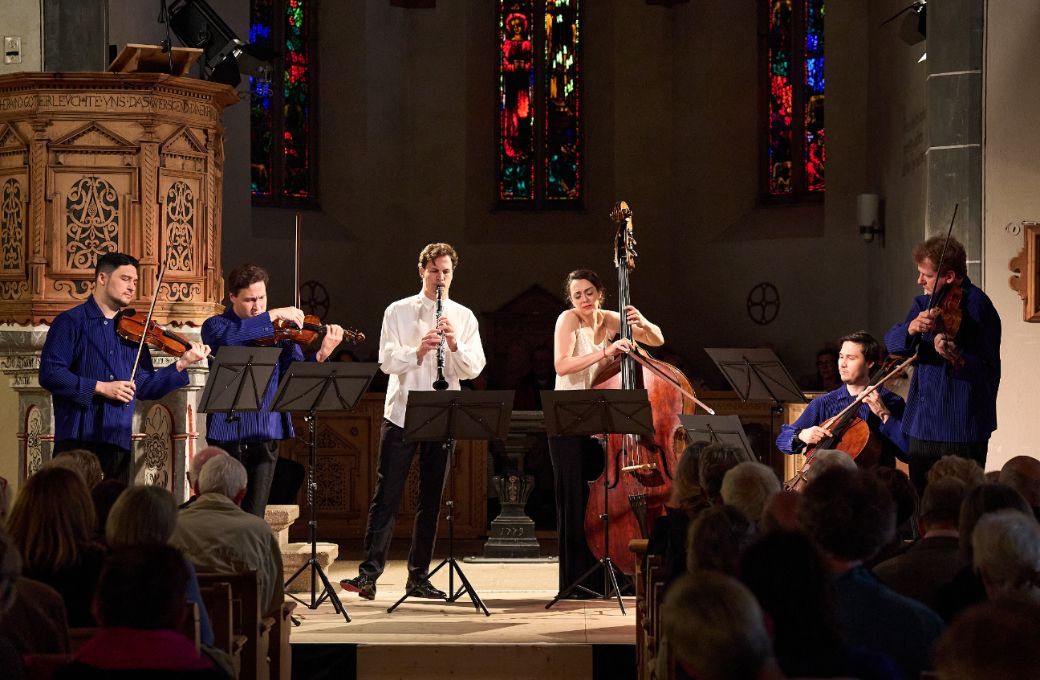This recital began with a novelty, a chamber arrangement by Andreas Ottensamer of four of Mendelssohn’s Songs Without Words, popular solos for amateur pianists. The selection included favourites such as the Venetian Gondolier’s Song, Spring Song and the Kinderstück. The arrangements were for string quartet and clarinet, plus the double bass of leading Spanish bassist Uxía Martínez-Botana, who seemingly came to Klosters for just the ten minutes of this item, but her presence was certainly felt in the warm resonance of St Jakob’s Church. Doubtless someone who teaches in Barcelona and Cremona, as well as working with the Oxford Philharmonic and guesting everywhere, is used to travel. Ultimately though these pieces made a slightly inconsequential opener, Mendelssohn’s charming miniatures sounding over-parted, snatched from their accustomed domestic service and pressed into public performance.
Andreas Ottensamer, Uxía Martínez Botana and the Schumann Quartett
© Benno Hunziker
Better able to announce itself was Beethoven’s String Quartet no. 4 in C minor. This is the most celebrated of the composer’s Op.18 set of quartets, partly because its tonality presages the turbulence of Beethoven’s later C minor works. From the outset it can seem a troubled piece, with passages of restlessness in the first movement. The second movement is more playful – even its ‘make your mind up’ marking of Andante scherzoso quasi allegretto sounds ludic. But it is difficult to imagine elegant dancing to its unusually brisk and brusque Minuet, while its finale is in the robust Hungarian style, with virtuoso demands on the first violin, and a scampering Prestissimo coda. Beethoven seems determined to show early in his career what he can do with a serious and important form which he would later take to unsurpassable heights.
The Clarinet Quintet by contrast was a genre effectively invented by Mozart, and nailed at the first attempt with what is still its finest example. His fellow freemason Anton Stadler was a clarinettist of rare skill, who inspired and premiered this A major quintet. But although the clarinet part needed all his skill, Mozart does not provide a showy concertante piece, but one where the strings and the wind instrument are true partners, rather than soloist and accompaniment. This very much suited tonight’s performers, for the Schumann Quartett (three Schumann brothers and viola player Veit Hertenstein), who had excelled in the Beethoven, are friends and regular collaborators with tonight’s clarinettist, Andreas Ottensamer. Until recently Principal Clarinet of the Berliner Philharmoniker, Ottensamer now plans to do more conducting but promises to retain some of his solo work.
Andreas Ottensammer and the Schumann Quartett
© Benno Hunziker
This concert was titled “Amongst Friends” and, since Ottensamer was making his Klosters debut, why not get his quartet friends to join him in every clarinettist’s calling card? The Schumanns played with a predictably homogeneous string sound, evident from the first theme, given to strings alone, and in such passages as the first Trio in the Minuet, where the clarinet has a rest. Elsewhere Ottensamer, playing quite beautifully, exerted some solo freedom in decorating his part, an arabesque here, a trill or grace note there, but always subtle and musical. Mozart would have expected no less, and I swear Stadler’s happy shade could be seen beaming down from the impressive roof of St Jakob’s. I predict this debutant will be invited back – one hopes with his clarinet.
Roy’s press trip was funded by Klosters Music Festival.
****1
